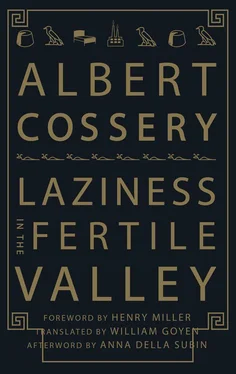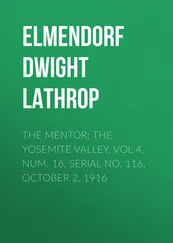Albert Cossery - Laziness in the Fertile Valley
Здесь есть возможность читать онлайн «Albert Cossery - Laziness in the Fertile Valley» весь текст электронной книги совершенно бесплатно (целиком полную версию без сокращений). В некоторых случаях можно слушать аудио, скачать через торрент в формате fb2 и присутствует краткое содержание. Год выпуска: 2013, Издательство: New Directions Publishing Corporation, Жанр: Современная проза, на английском языке. Описание произведения, (предисловие) а так же отзывы посетителей доступны на портале библиотеки ЛибКат.
- Название:Laziness in the Fertile Valley
- Автор:
- Издательство:New Directions Publishing Corporation
- Жанр:
- Год:2013
- ISBN:нет данных
- Рейтинг книги:3 / 5. Голосов: 1
-
Избранное:Добавить в избранное
- Отзывы:
-
Ваша оценка:
- 60
- 1
- 2
- 3
- 4
- 5
Laziness in the Fertile Valley: краткое содержание, описание и аннотация
Предлагаем к чтению аннотацию, описание, краткое содержание или предисловие (зависит от того, что написал сам автор книги «Laziness in the Fertile Valley»). Если вы не нашли необходимую информацию о книге — напишите в комментариях, мы постараемся отыскать её.
Laziness in the Fertile Valley — читать онлайн бесплатно полную книгу (весь текст) целиком
Ниже представлен текст книги, разбитый по страницам. Система сохранения места последней прочитанной страницы, позволяет с удобством читать онлайн бесплатно книгу «Laziness in the Fertile Valley», без необходимости каждый раз заново искать на чём Вы остановились. Поставьте закладку, и сможете в любой момент перейти на страницу, на которой закончили чтение.
Интервал:
Закладка:
Against this monetization of time Albert Cossery stood firm. As monuments cheering Egypt’s progress went up, Cossery chose in his novels to reveal the deep bedrock of sloth underlying it all. Sleep nibbles everything, he wrote, “like the teeth of invisible rats.” In Laziness , retired civil servants grow moldy on the outskirts of the city, while in the center, workers in dusty corporate offices are asleep. There is the idleness that stands against work, and an idleness within work. There is the private and the public laziness. Abou Zeid, the peanut seller, naps in his empty shop; the factory that would threaten the countryside, eternally under construction, is a stage-set for Serag’s torpor. In Cossery’s novels, the only one who works hard is the prostitute. And yet, laziness goes beyond doing nothing. “The more you are idle, the more you have time to reflect,” Cossery said in an interview in his eighties. Laziness is a critical position by which to judge the world — a perspective the salaried clock-puncher lacks. “The Orient is more philosophical than the Occident,” Cossery declared. “Everyone’s a philosopher because they wait, they think. Everyone in the West is after money. I have lived my life minute by minute,” though it had meant dire financial straits. With idleness comes godliness. Away from the hourglass of the city, Cossery said, “the further one goes toward the South, toward the desert, there are more prophets, more magi — more people who have reflected on the world.” After his death, the long-sleeping Epimenides was honored as a god in Crete.
In a cartoon published in 1921 in the journal al-Kashkul, the sculptor Mukhtar rides on top of a sphinx, with an alarm clock in each hand. “Did the alarm clock awake you to behold the Awakening statue?” asks a voice in the picture. “It gave me a headache,” another voice replies, “all I see in the Awakening is noise, commotion, and discord.” In A Splendid Conspiracy, as Teymour contemplates the statue of the Awakening, he observes, “she seemed to be lamenting the fact that she had been woken up to see this abomination.” In Laziness , through the character of Serag, Cossery poses the question whether Egypt should slip back into its slumber, given the dissonance brought about by the attempt to catch up with modernity. Serag’s name means “lamp,” a beacon (or a nuisance) in the darkness of the family home. When he threatens to leave for the city to find work, Rafik attempts to rid him of his illusions. “Do you know, my dear Serag, that there are countries where men get up at four o’clock in the morning to work in the mines?” “Mines!” says Serag, “It isn’t true; you want to frighten me.” “I know men better than you do,” Rafik replies. “They won’t wait long, I tell you, to spoil this fertile valley and turn it into a hell. That’s what they call progress. You’ve never heard that word? Well, when a man talks to you about progress, you can be sure that he wants to subjugate you.”
As Teymour sits in the Café Awakening, a noisy caravan passes before him. It’s Wataniya, the monstrous madame of the local brothel, showing off her coterie of hookers. Cossery’s choice of name is striking, for the word “wataniya” means “nationalism.” If the peasant woman of Mukhtar’s Awakening statue had a name, she too would be Wataniya. The name plays on the tradition of metonymy in earlier Egyptian nationalist novels — such as Husayn Haykal’s Zaynab, widely considered to be the first Egyptian novel, and al-Hakim’s The Return of the Spirit, about the days leading up to the 1919 revolution — in which the main female character is used to represent the nation. And yet, in Cossery’s version, the notables of the city keep disappearing into Wataniya’s fatal brothel. As landowners and bureaucrats are mysteriously killed, the whore “Nationalism” emerges as a deadly trap. Better to sleep than risk her caresses.
Though the people might slave for the flourishing of this new imagined “Egypt,” and sacrifice themselves to her, the entrenched powers did not want the nationalist spirit to get too far ahead. When Cossery left for Paris in 1945, the year he wrote Laziness, Cairo was in the midst of what would be nostalgically remembered as its gilded age. Money had flowed in from Europe during the two wars, enriching the aristocratic elite. Cinemas, opera houses and villas shot up along the boulevards, in styles that mixed Art Deco with Arabesque and Neo-Pharaonic, a craze that had struck Egypt since the discovery of King Tut’s tomb in the twenties. Armenian studio photographers captured pasha’s wives in the latest fashions from Paris. A cast of glamorous exiles sipped whiskey at the Gezira Sporting Club, while Winston Churchill, Franklin Roosevelt, and Generalissimo Chiang Kai-shek convened at the foot of the Pyramids. In 1936, King Farouk took the reins of power from his father Fuad, who, along with Farouk’s mother, Queen Nazli, had kept Breton’s imp of the perverse well-fed. While Nazli performed nighttime séances, Fuad slept with a Circassian servant girl curled up on a rare Chinese carpet at the foot of his bed. Unbounded by means or appetite, the fattened Farouk rolled between his four palaces and yachts with his chief confidante, an Italian plumber, by his side.
Farouk was at best a puppet of the British: much of Egypt was foreign-owned, including its entire tramway and electrical networks. Under his reign, the veneer of “progress” belied the worsening misery of the poor. While the rich literary culture that first published Cossery and Jabès flourished, only one in seven Egyptians could read. Child labor, sixteen-hour workdays, and corruption were common. City sharks swindled the rural poor. As public health improved, the population exploded — Cairo began to grow so fast that it lost control of its own slums. In a short story from the thirties, Cossery described the march of the city lights across the Egyptian countryside: “Strange harlot’s body: it spread in all directions, always venal, always interested. And the countryside fled before it, rapid and monotonous. The city chased it without respite. Accursed countryside, which went off to vomit its distress at the edges of the poorer quarters.”
In their villa on the outskirts, Serag’s father scares him from looking for a job in the city by telling him that the government has arrested rebels. “But was he a rebel? Was his desire to look for work and to mingle with working men a revolutionary act?” Cossery writes. “Serag didn’t understand why his love of an active life should be considered by the government as an attempt at revolt against the established laws.” In 1945 alone, thousands of workers were arrested during trade union strikes and government crackdowns. It was too dangerous to hope for better labor conditions, or to challenge the monarchy held up by strings. Instead, as Cossery wrote in Laziness , “the country slept in its snare.”
On July 2, 1952, a few months before its publication date, a case of the New Directions edition of Goyen’s translation of Les fainéants , then titled The Lazy Ones , was lost or “hijacked” off a truck somewhere in New England. On the 23rd of that month, a coalition of young Egyptian army officers led by Gamal Abdel Nasser overthrew the regime in a coup d’état. With Farouk exiled, Nasser introduced socialist reforms, seized foreign businesses, and redistributed Egyptian wealth. “Arab nationalism is fully awakened to its new destiny,” Nasser declared in 1956, as he pushed for the nationalization of the Suez Canal. And yet, as workers were killed by the police and intellectuals imprisoned, it became clear to many that the awakening had only replaced one bad dream with another. In Cossery’s 1964 satire The Jokers, a mad old lady has a dream about her son’s friend Heykal (perhaps named after the author of Zaynab, an opposition leader.) A practical joker and an anti-authoritarian agitator, Heykal and his comrades set out to topple the regime by postering the city with embarrassingly effusive pro-government propaganda. In the dream, Heykal is riding on a white horse and slaying a dragon. Yet after each blow, the dragon is reborn and refuses to die. “And you, prince, you laughed and laughed,” recounts the woman. “And I knew why you laughed. Deep down, you didn’t want to kill the dragon; the dragon entertained you too much for you to want it dead.”
Читать дальшеИнтервал:
Закладка:
Похожие книги на «Laziness in the Fertile Valley»
Представляем Вашему вниманию похожие книги на «Laziness in the Fertile Valley» списком для выбора. Мы отобрали схожую по названию и смыслу литературу в надежде предоставить читателям больше вариантов отыскать новые, интересные, ещё непрочитанные произведения.
Обсуждение, отзывы о книге «Laziness in the Fertile Valley» и просто собственные мнения читателей. Оставьте ваши комментарии, напишите, что Вы думаете о произведении, его смысле или главных героях. Укажите что конкретно понравилось, а что нет, и почему Вы так считаете.












